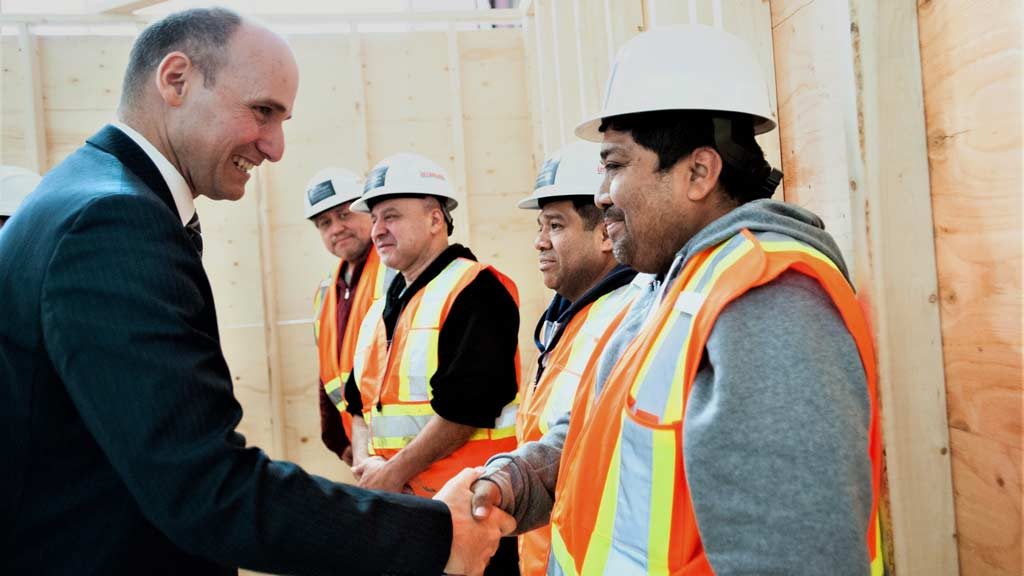A front-line negotiator says the federal government’s 11-year, $13.75-billion Rental Construction Financing Initiative (RCFI) will soon bear fruit big time in Toronto as developers start to close more deals with the program’s administrator, Canada Mortgage and Housing Corporation (CMHC).
Success is coming as developers see the merits of combining the RCFI’s low-cost loans with such provincial programs as Ontario’s sell-off of surplus lands and municipal initiatives such as the waiver of fees, the creation of the Open Door Affordable Housing Program and the engagement of CreateTO, said CMHC affordable housing specialist Michele McMaster, whose job involves negotiating RCFI deals with the housing sector.
“All the developers are talking to us because interest rates are fantastic and we are making very collaborative efforts,” said McMaster recently. “The developers who you would traditionally think of as condo developers, the finance organizations like REITs, pension funds, everybody in the entire sector who has an interest in owning and developing rental property is talking to us.
“It would be a fair statement to say that the development industry is aware of the need and the business opportunity and we expect that within the next five years there will be a huge amount of rental construction throughout the GTHA.”
The interest rates for loans that have been funded under the RCFI program have ranged between one to three per cent, depending on the interest-rate environment and on project-specific characteristics. That’s between one and three per cent lower than alternative financing.
“Developers say that’s the cheapest rates around,” said McMaster. “Everyone is impressed with the rates.”
The RCFI was launched in 2017 and expanded in Budget 2018, increasing the available loans from $2.5 billion to $3.75 billion over three years. This year’s budget further expanded the initiative, adding $10 billion over nine years, increasing the total loans available to $13.75 billion. The target is 42,500 new units across Canada.
A sister program that more directly targeted affordable housing, the National Housing Co-Investment Fund, was initiated in May 2018. Both are part of the government’s National Housing Strategy.
With the RCFI, at least 20 per cent of units must have affordable rents, defined in the program, and that affordability must be maintained for at least 10 years.
McMaster explained the RCFI is a more streamlined apartment-supply program with an affordability component, while the co-investment program has more social targets including energy efficiency.
So far the CMHC has committed $3.7 billion from the RCFI to support the creation of 12,000 units, of which over 8,300 will be affordable. About 2,800 units are currently under construction.
We are short at least 15,000 housing units a year in the GTA just to keep up with demographic projections,
— Richard Lyall
Residential Construction Council of Ontario
Major projects supported in Toronto have included the Terraces of Princess Gardens in the city’s west end, a 16-storey building with 259 units announced March 14 with an $89-million loan through the RCFI, and the 761-unit Block 8 project announced June 27 for the West Don Lands, financed with $357 million in RCFI funds. The developers Dream Unlimited Corp., Dream Hard Asset Alternatives Trust, Kilmer Van Nostrand Co. Limited, Tricon Capital Group Inc. and Princess Management all praised the RCFI program in statements.
RioCan Living is also seeking RCFI funding for its 36-storey eCentral tower, part of the ePlace development planned for the corner of Yonge and Eglinton in Toronto, and a spokeperson said further RCFI funding for other RioCan Living rental projects would be pursued as appropriate.
McMaster explained that the bulk of the loan announcements will come years after initial discussions.
“We tell people to apply for our funding when they are about nine months away from breaking ground,” she said.
“The reality is I start meeting with people several years before they are at that stage. I just met with several big concerns last week that have extremely robust pipelines but they haven’t got to the stage of site plan approval, they are working on a giant strategic macro level.”
McMaster said the low-cost loans are not the only incentives in the RCFI attracting the attention of developers. The program includes an amortization period of up to 50 years with no premium surcharge, and a 10-year term with a fixed interest rate locked in at first advance that she said provides certainty during the risky early-construction period.
“We consulted widely to determine what they need, to make it work,” said McMaster.
Richard Lyall, president of the Residential Construction Council of Ontario, said the boost in funding for the RCFI is positive but the program itself won’t come close to creating the number of rental units Toronto needs each year. The Province’s Bill 108 and the reduction of rent controls will also contribute to creating more rental housing, he said, but expediting zoning and site plan approvals must be addressed.
“But even at the high end of the metrics, it is worth keeping in mind we are short at least 15,000 housing units a year in the GTA just to keep up with demographic projections, which does not include putting a dent in the backlog,” he said. “So while this (the RCFI) is important, it will by itself not come close to fixing the problem.”
CreateTO is charged with activating 11 City-owned sites for the development of affordable housing. The first phase of its Housing Now program was launched this year with the target of building 10,000 new homes, including approximately 3,700 affordable rental homes.
Follow Don Wall on Twitter @DonWall_DCN.











Recent Comments